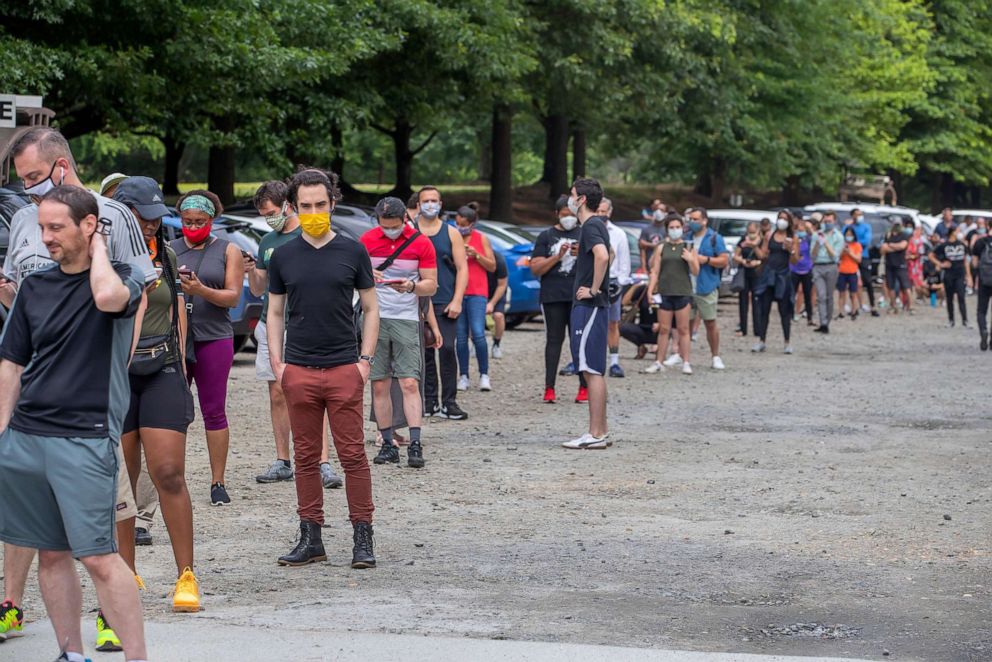Georgia secretary of state showed 'deliberate indifference' to voters: Stacey Abrams
Her comments come after the primary election was plagued by problems.
Stacey Abrams, the 2018 Democratic gubernatorial candidate in Georgia, said Thursday that Secretary of State Brad Raffensperger "showed a deliberate indifference to the needs of Georgia voters" after Tuesday's primary election faced numerous problems, from lack of poll workers to issues with the voting machinery.
"(Raffensperger) refused to exercise his responsibility to oversee our elections," Abrams said on ABC's "The View." "In fact, he said that he had no responsibility for what went wrong, that it wasn't his fault that he paid for $170 million worth of machinery that he didn't train people adequately to use."
Abrams and the voter protection organization she founded, Fair Fight Action, were collecting voter testimonials all throughout Election Day and during an election night media availability, she said litigation would be coming and that it would be coming soon.
Georgia's primary election was plagued by problems that left many voters waiting in line for hours, particularly in the state's largest county, Fulton, which is home to most of the city of Atlanta. On election night, Rick Barron, the director of elections for the county, said they hadn't "seen anything like this since 2012 in terms of issues on election day."
Barron said many poll workers never showed up and there were several new poll workers. The county was using brand new voting equipment, and Barron said that because of the coronavirus, officials were unable to do sufficient in-person training and instead relied mostly on virtual trainings. That meant the people tasked with operating the new machines weren't able to get their hands on the equipment, which Barron said led to a lot of confusion on Election Day.
He also said sometimes the ballot scanners would jam, and other times it seemed too many machines were plugged into the same circuit, leading to power issues.
Barron said the county would be doing "a good post-mortem on this election," adding, "There will be a lot of room for improvement." But he also echoed Abrams and others in the Democratic Party who are saying there needs to be accountability from the state's top election official. Barron said Raffensperger "can't wash his hands of all the responsibility."
Abrams said on "The View" that the secretary of state is the "election superintendent" in Georgia, and that's it's "his responsibility to direct, to train and to oversee the conduct of our elections," and that it's up to the counties to handle the implementation.

Mid-day Tuesday, Jordan Fuchs, the deputy secretary of state in Georgia, chalked Fulton County's machine issues up to poll workers' lack of training, saying she would go with inspectors to investigate and find that the equipment worked fine, but the poll workers didn't understand how to use it properly.
Raffensperger has skirted nearly all responsibility for the problems on Election Day, saying it's up to the counties to conduct a successful election. In the midst of Election Day, he called for an investigation into both Fulton DeKalb Counties' problems, and then on Wednesday he announced he would be proposing legislation to the state legislature that would give his office "greater authority to directly intervene."
"We are here to protect every voter. Republicans, Democrats and Independents deserve well run elections. That is why we are proposing to the General Assembly legislation that will enable the state to intervene and look into failing elections offices, when it’s clear there are continued failures," Raffensperger said in a statement.
But Abrams said he was pushing a "false narrative" that the issues were unique to Democratic-run counties. She said the issues affected "every single part of" the state, not just the metro Atlanta area.
"We saw a combination of malfeasance... but also incompetence. And if we don't solve both of those problems, we're going to have a national breakdown of our elections come November," she told "The View" co-hosts.
But asked about the potential that this mess of an election may convince some people it's not worth going to the polls in the fall, she said that Americans need to "be angry about voter suppression, not defeated by it."
Abrams was also asked about the renewed debate over removing Confederate flags, monuments and insignia from American cities and institutions, including the U.S. Military.
President Donald Trump has said he won't support renaming military bases currently named after Confederate generals, and his press secretary said Wednesday that renaming bases like Fort Benning, which is partly in Georgia, would be an insult to the Americans who were based there and later died in war.
"It's part of his narrative to continue to lift up those who were strong men who use their domestic terrorism to rip our nation apart," Abrams said.
Her new book, "Our Time is Now," which was published Tuesday, addresses not just voter suppression, but also identity politics and how Trump has tried "to turn our identities into weapons against us instead of seeing it as ways to serve us."
"If we want justice for all. We have to acknowledge how justice is denied. And that is the argument that Donald Trump is doing his best to avoid," she said.
Co-host Whoopi Goldberg also asked Abrams about the current debate over defunding the police and the nationwide demands for law enforcement reforms that has played out in protests.
"No one should believe that systemic racism, that systemic inequities... should be allowed to run rampant and to only have one solution, which is criminalization," Abrams said.
People are talking about "transformation," she continued. "We have to rethink what we do because what we're doing doesn't work... our broader conversation has to be, how do we transform what we see as public safety, so that the entire public can be safe."




